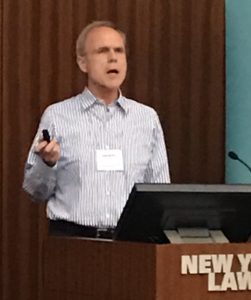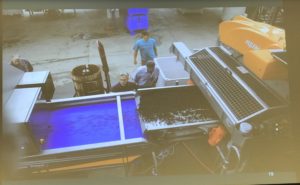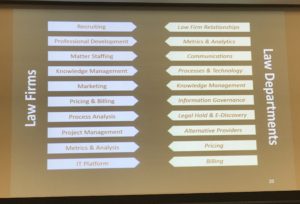This is a live post from the 12th Annual Ark Knowledge Management (KM) conference. (PDF of Agenda). I publish as a session ends so please forgive any typos or misunderstandings of meaning.
This session is the keynote, Practice Engineering: KM for the 21st Century, byMichael Mills, Co-Founder & Chief Strategy Officer, Neota Logic. The session description appears at the end of the post.
Session Report
Goal: create a grand unified theory of knowledge management. The elephant in the room is the ever looming move to fixed fees – with the market for 3 decades.
Law firm in the past – and still today – are very simple places. Lawyers work with assistants It is still like the medival workshop with masters + apprentices, a very artisinal approach. This model prevails today. To the extent it is not the real model of law firms everywhere, it is the mental model of most practicing laywers. But it is the wrong mental model.
Michael says he is often accused of wanting to replace lawyers with robots (via expert systems). But that is not the goal of automation. The goal is to create more efficient, fully integrated systems. But lawyers and law firm managers do not think of their work or businesses as systems. But taking that mindset would have many advantages.
Engineering problems – like law problems – are under=defined. The task is to arrive at a good solution. What does this mean for lawyers? One way to think about what lawyers and firms do, which is:
- Information
- Execution
- Advice
So the system needs to deliver all three of these. The most sustainable is advice; the most susceptible to replacement is at the top.
Information was once the sole province of law firms, like Latin in the Church, only the priests understood. Today, information is readily available from multiple sources.
Execution remains hard. Law firms are good at getting things done. Clients still prize law firms getting things done, even if they don’t always readily acknowledge this. Execution involves people, processes, project managent, documents, and collaboration and control.
Advice includes experience, expertise, judgement. It’s knowing the law and being able to analyze and apply. For transactions, it means creating a structure, strategy, documents, and negotiation. In litigation, it means strategy, arguments, pleadings, and advocacy. This is hardest to disrupt.
But even in the most bespoke and complex work, there are many elements of routine work.
Systems engineering extends beyond the core work of delivering advice. There is the element of service delivery – how the client experiences dealing with the law firm. Michael likens it to how Apple designed the iPhone box to open with precisely a certain feel and swish.
“Being a good wine maker is harder than being a good lawyer”. Good wine makers now use opitcal sorting with artificial intelligence to sort the grapes. They use machine learning to select the best / right grapes.
Law firms face many selection issues – hiring, which matters to accept, what price to charge, how to staff a matter, and what processes to use. So law firms are, in fact, complex systems. This is the domain of legal operations professionals. There is much opportunity to apply technology.
At the same time that firms are engineering themselves, clients are going through a similar process, especially with the rise of corporate legal operations professionals (e.g., ACC LDO group and CLOC). The diagramm below maps law firm processes / elements with corresponding ones in law department operations.
Law firms have an opportunity to improve their organizational functioning and systems engineering. Law firms have too many separate centers – practices and departments. A modern firm needs an engineering perspective. Such organizations have individuals with the responsibility and authority, not to deliver, but to make sure the delivery systems are informed by the best principles of systems engineering.
One firm came up with a consensus-driven but firmwide approach / framework to conduct ligitation.
Truly bespoke mean starting with a blank sheet of paper. Lawyers, however, rarely do this. They almost always start with prior work product or precedents. Many firms have actually routinized elements of work, for example, with document assembly. Other firms have undertaken formal process mapping and improvement. Other firms have adopted formal (legal) project management. Others have developed automated systems to answer questions. These are all elements of a systems engineering approach.
As a group, we should study systems engineering. This should inform both KM and how KM relates to pricing, business development, and other functions. Today, these discrete roles roll-up to the COO typically. Firms need to do more to integrate and undertake formal systems engineering.
Session Description
Practice Engineering: KM for the 21st Century
Long ago and far away, it was simple: we wrote memos and sent them to the Library, where librarians cataloged them. Then, late at night, we riffled through the card catalog to find the brilliant work-product of our forebears. Today, we have search and social, we write email instead of memos, we don’t have libraries. We map our processes, sigma our sixes, manage our projects, value-base our fees, mine our middling data, and price like crazy. As Ted Nelson wrote, “Everything is deeply intertwingled.” The time has come to pause and reflect, look at the long road ahead, and unify our thinking. We seek the Grand Unified Theory of Practice. Or even a Theory of Everything.
Michael Mills, Co-Founder & Chief Strategy Officer, Neota Logic
Archives
Blog Categories
- Alternative Legal Provider (44)
- Artificial Intelligence (AI) (57)
- Bar Regulation (13)
- Best Practices (39)
- Big Data and Data Science (14)
- Blockchain (10)
- Bloomberg Biz of Law Summit – Live (6)
- Business Intelligence (21)
- Contract Management (21)
- Cool Legal Conferences (13)
- COVID-19 (11)
- Design (5)
- Do Less Law (40)
- eDiscovery and Litigation Support (165)
- Experience Management (12)
- Extranets (11)
- General (194)
- Innovation and Change Management (188)
- Interesting Technology (105)
- Knowledge Management (229)
- Law Department Management (20)
- Law Departments / Client Service (120)
- Law Factory v. Bet the Farm (30)
- Law Firm Service Delivery (128)
- Law Firm Staffing (27)
- Law Libraries (6)
- Legal market survey featured (6)
- Legal Process Improvement (27)
- Legal Project Management (26)
- Legal Secretaries – Their Future (17)
- Legal Tech Start-Ups (18)
- Litigation Finance (5)
- Low Cost Law Firm Centers (22)
- Management and Technology (179)
- Notices re this Blog (10)
- Online Legal Services (64)
- Outsourcing (141)
- Personal Productivity (40)
- Roundup (58)
- Structure of Legal Business (2)
- Supplier News (13)
- Visual Intelligence (14)



